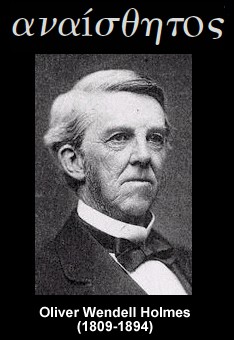
La palabra anestesia fue introducida por primera vez por el Dr. Oliver Wendell Colmes en 1846, cuatro semanas después de la primera demostración de la anestesia con éter en el Massachussets General Hospital. Anestesia proviene del griego anaistesis, que significa "sin sensación, sin dolor"; con o sin pérdida de la conciencia.
Ver el artículo: Analgesia y Anestesia: Etimología e Historia de las Palabras Griegas en Anestesia. Helen Askitopoulou. Anesth Analg 2000;91:486–91.
"Greek is a particularly cultivated language and has been used to express and refine philosophical and scientific concepts for more than 30 centuries. It is not by chance that international scientific language has formed, and continues to form, many of its terms by borrowing Greek roots, words, or word parts."
"The ancient Greeks were preoccupied with what we now call the “theory of language.” Plato, in his dialogue Kratylus, examined the history of names and claimed that words, as names of things, were directly connected with the objects they indicated. If we learned the names of things, therefore, we could easily understand the things themselves, because the study of the language then formed the only method of scientific research and discovery. Today, the original meaning and use of current medical terms in ancient Greece is not widely known. In this article, the etymological, linguistic, and literary aspects of words of Greek origin, used in current anesthetic practice, are examined. The described words of Greek origin are presented in Table 1 with their Greek spelling, meaning, and etymology."
Archivo: Recuperar el artículo complete de la red. [Clic aquí]

